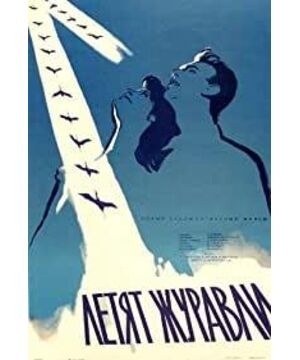To say that the film is clean means that it has almost no ideological expression. Except for the last speech, the whole film is a universal story. Waiting for the fiancé’s woman, Pipa, don’t hug, and all kinds of thoughts and imaginations The share of "happiness." Therefore, a Cannes award is not an exaggeration. The film inevitably has some Soviet-Russian branding, such as the collective enthusiasm in the factory, but the portrayal of the characters, including Soviet soldiers, is no different from the war films of other countries (except for the natural socialist realism system). It expresses a kind of universal humanity: Veronica's "betrayal" forced by life, and "greed" for which Mark can clearly see the cause. It does not have the sense of sympathy and symbolism commonly seen in socialist realism movies. . This is an important reason why the film has gained a wide international reputation.
Entering from the way of symptomatic reading, what I see is the weakening of the intention of war. The war is only the motivation of all the characters in the film. The extremely short battle scenes and the German enemies who have never appeared at all show this. This seems to express Karatozov's rejection of the Soviet film's function as an ideological propaganda tool. He no longer expresses the battlefield but expresses the people in the rear, which also shows another way of interpreting the "War to Defend Soviet Power" in the mainstream narrative. A slight extension is another attitude towards Stalin, a war hero. This is not intended to be attached. In 1957, this kind of seemingly "humanitarian" narrative appeared in the Soviet film system, which will not fail to attract our attention.
The scheduling of the big scenes in the film is very delicate. So Karatozov doesn't know how to shoot wars, but doesn't want to shoot wars at all. The more than 10 minute drama of seeing off the volunteers was extremely impressive. And the superimposed shot written in many movie textbooks is a classic in the classics: the rotating sky simulates the fall of a soldier, and the rotation of the stairs that previously referred to the sweet love between Boris and Veronica Climbing forms a superposition of meaning, countless flashbacks and wild geese appearing in the sky-the rich and flashing montage method is the best signature of Soviet films.
He called her little squirrel, and he hid his letter in the basket of the little squirrel he gave her. She didn't find out until many years later. She saw the wild goose in the sky. Was that the wild goose he and her saw together? Is that the group of geese he saw before he fell? The group of geese flew quietly through the birch forest. Karatozov was writing poems in the name of war.
View more about The Cranes Are Flying reviews






